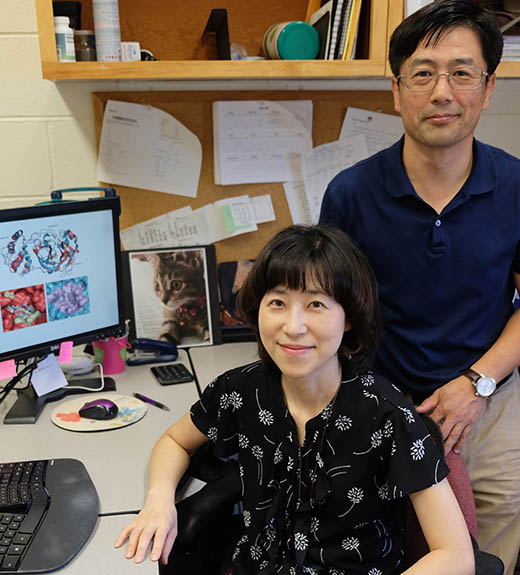University licenses technology for coronavirus and norovirus compounds
Friday, Feb. 28, 2020

Kansas State University College of Veterinary Medicine virologists Yunjeong Kim, front, and Kyeong-Ok "KC" Chang, back, along with medicinal chemist William Groutas at Wichita State University, have developed technology that K-State Innovation Partners has licensed to Cocrystal Pharma Inc. for possible antiviral drugs to treat coronaviruses and noroviruses. | Download this photo.
MANHATTAN — Amid increasing worldwide concern about a novel coronavirus, COVID-19, Kansas State University has licensed a technology that may lead to the production of an antiviral drug to treat coronaviruses and noroviruses.
Yungeong Kim and Kyeong-Ok "KC" Chang, virologists in the K-State College of Veterinary Medicine, and William Groutas, a medicinal chemist at Wichita State University, have been using National Institutes of Health grants to work on human norovirus therapeutics and recently received an additional $3.7 million grant to develop antiviral drugs to treat Middle East Respiratory Syndrome, better known as MERS human coronavirus. Their work extends to other human viruses that have a similar viral protease, such as rhinoviruses and the newly emerged human coronavirus, COVID-19.
No antiviral drugs are yet available for human norovirus or coronaviruses, which include SARS, MERS and COVID19.
This could change as a result of a new license agreement between K-State and Cocrystal Pharma Inc., a clinical stage biotechnology company that is discovering and developing novel antiviral therapeutics to further develop certain proprietary broad-spectrum antiviral compounds for the treatment of norovirus and coronavirus infections.
Cocrystal has been granted an exclusive license to certain antiviral compounds developed by Kim, Chang and Groutas. The company intends to pursue research and development of theses antiviral compounds, including preclinical and clinical development.
"This licensing agreement provides support to confront the emerging strain of coronavirus with urgency and caution," said Bonnie Rush, dean of the College of Veterinary Medicine at K-State. "The work of our K-State researchers is tremendously challenging and has never been more timely."
Rush said Chang and Kim have collaborated for years on the development of antiviral compounds to combat devastating viral diseases of humans and animals.
Similar to coronaviruses, human norovirus is a major pathogen with 10-21 million cases each year in the U.S. alone. The virus causes gastroenteritis and is also a potential bioterrorism agent because of its ability to cause debilitating illness.
"Our protease inhibitors target a virus protein called 3C or 3C-like proteases, which are essential for virus replication," Kim said. "Other antiviral drugs that have a similar mechanism are HIV protease inhibitors and hepatitis C virus protease inhibitors, but these do not work well against coronavirus."
The licensing agreement was coordinated by K-State Innovation Partners, formerly known as the Kansas State University Research Foundation.
"The team at Cocrystal Pharma moved with a high sense of urgency to finalize the license negotiations," said Bret Ford, director of business development and licensing at Innovation Partners. "We look forward to watching them move with the same sense of urgency to advance our antiviral compounds toward human clinical trials."
This license agreement with K-State advances the company's antiviral programs significantly by providing potent compounds for further development.
"We are incredibly pleased to contract with the Kansas State University Research Foundation as we seek to develop safe and effective antiviral therapies for these viruses," said Sam Lee, president of Cocrystal. "This license agreement opens several development opportunities for us to expand the broad utility of our platform to address significant viruses for which there are unmet medical needs, particularly the COVID-19 coronavirus and norovirus."
The focus of research for Kim, Chang and Groutas has been on human viruses. However, some very important discoveries related to animal viruses such as feline coronavirus have also resulted from their research.
"We were able to utilize our knowledge and resources to develop a protease inhibitor for this animal viral disease along the way," Kim said. "It is very encouraging for this suggests that we are on the right track for our approach and also that we can contribute to improving animal health."
